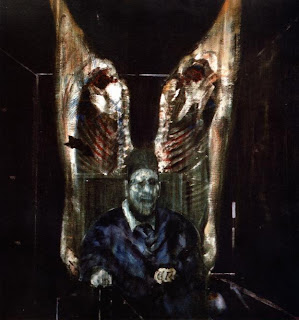 One of my favorite scenes from the Tim Burton Batman was the scene where the Joker (Jack Nicholson) and his goons trash some great pieces of art. However, when one of his goons tries to knife the picture above (Figure with Meat by Francis Bacon) the Joker stops him and says: "I kind of like this one, Bob. Leave it."
One of my favorite scenes from the Tim Burton Batman was the scene where the Joker (Jack Nicholson) and his goons trash some great pieces of art. However, when one of his goons tries to knife the picture above (Figure with Meat by Francis Bacon) the Joker stops him and says: "I kind of like this one, Bob. Leave it."The fact that the Joker likes Bacon and wants it left alone illustrates just how screwed up or warped Bacon's art is perceived. I think this is one of the reasons French philosopher Gilles Deleuze turns to Bacon's work; it serves as a good testing ground for how we may perceive things. Deleuze was ahead of his time in picking subjects outside of the typical canon to analyze. I'm currently reading another intro to Deleuze at this time and plan to jump into his book on Bacon next week.
One of my goals as an adjunct history professor is to also pull from the works of literature, art, cinema and music as ways to understand history rather than simply looking at the typical, great, so-called human events. There are more forces and factors that determine what we humans experience. Art is one of the best ways to see this fact more clearly.
See this link for the Joker scene: http://www.youtube.com/watch?v=9tgxIWgJ_DE






